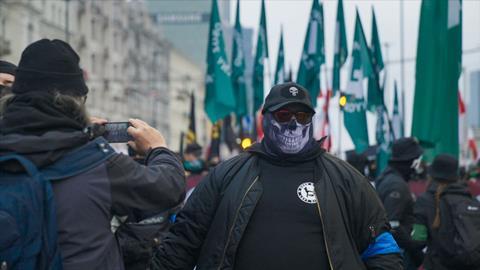As Christian symbolism becomes increasingly common at far right rallies, Chine McDonald urges church leaders to condemn racism and misogyny

A few weeks ago, I was invited to Channel 4 for a secret preview screening of the explosive documentary Undercover: Exposing the Far Right. The film went behind the scenes of the modern workings of modern far right extremism in the UK and Europe, and included an undercover investigation conducted by the anti-fascist movement Hope not Hate.
In the film, we got to see what the Far Right say when they think no one is listening. The violent misogyny, the abhorrent racism and the eugenicist ideas. But there was something else that I found particularly disturbing: the Christian symbolism.
When the cameras pan across at Far Right rallies in British towns, and Eastern European cities during the film, we see Christianity making appearances: whether it’s through extremists holding up pictures of Pope John Paul II, banners with white Jesus’ face plastered on them, or crosses and crucifixes. We see Tommy Robinson introduced on Alex Jones far-right talk show as a hero of Christianity in the UK. As we have come to expect, we see political party leaders from organisations such as Britain First denouncing the erosion of the nation’s Christianity, because of the “influx” of Muslim immigrants. This is despite the majority of immigrants to the UK being Christians. The problem perhaps therefore is that they’re not white ones.
There has been much anecdotal discussion about young men being drawn to Christianity because highly influential public intellectuals and podcasters such as Jordan Peterson and Andrew Tate have talked about our faith’s shaping of the values that underpin Western civilisation. In their promotion of Christianity – whether or not these public figures describe themselves as Christians – we hear a harking back to a nostalgic era. In these forgotten days, it is perceived that men had more purpose, power, and meaning. So many men today, especially younger generations, are feeling hopeless. I want the Church to provide them with a sense of profound hope that comes from the saving work of Jesus Christ. I am nervous that some are rather drawn to a hope they might find in the power that comes with being in positions of dominance, at home and in wider society.
When my book God Is Not A White Man (Hodder & Stoughton) came out in 2021, I was struck by the criticism I received from faceless accounts online, some suggesting I was co-opting Jesus for my ‘woke agenda’.
I felt vulnerable as a black woman for saying in public that racism and misogyny should have no place in Christian witness. She would say that wouldn’t she. But I note the power that comes in the rare instances when I see prominent white Christian men saying the same thing. This is what we must encourage, if we are to see our faith extricated from the grip of extremist rhetoric.
The timely book The Church, the Far Right, and the Claim to Christianity by Helen Paynter and Maria Power, offers some helpful and practical tips, including investing in youth work, being prophetic and attentive to the spiritual dynamics at play, building biblical literacy, and avoiding stereotypes.
I know this won’t be easy. Many church leaders who worry about dwindling congregations are excited by the prospect of young men flooding in. I pray that – whatever it is that gets people through the doors – once they are part of a worshipping community, they won’t be left the same. That they will be embedded into congregations that are diverse in age, race, gender, class and politics, and that like the early Church – though not without its problems – will be changed because of it.






































7 Readers' comments